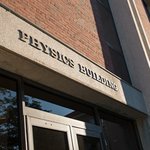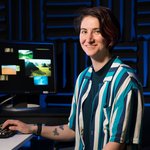Department of Physics
Satisfy your curiosity about the universe, from the largest astronomical scale to the smallest subnuclear particle. Physics will help you strengthen your quantitative reasoning skills and problem-solve through experimentation, simulation and analytical tools.
Imagine yourself exploring the galaxy, building the next quantum computer, dissecting how cells crawl, or shining light on how atoms and the world itself comes together. These exciting experiences can be found within the world of physics. Physics is concerned with the most basic principles that underlie all phenomena in the universe from sub-atomic particles to whole universes and everything in between. In Physics, you will learn about these exciting phenomena along with important skills in logic, problem solving, quantitative reasoning, and experimental design that employers in all fields are seeking. Our graduates from both our PhD and bachelor’s programs go on to work in academia, national labs, engineering industries, data science, in Silicon Valley and on Wall Street.
The Mission of the Physics Department is to create a community of physics scholars dedicated to excellent research and teaching that is welcome to all! We are thrilled to have you on the team for this important mission.
Faculty research areas include:
Upcoming Events
Recent Physics News

(Feb. 4, 2026)
The Science Behind Super Bowl SundayEver wonder why a perfect spiral flies farther or if laces out really matters? Breaking down the surprising science behind football's biggest plays just in time for the Big Game.

(Dec. 23, 2025)
Failed Supernova, Cosmic FireworksSyracuse University researcher shows that a supernova sputtered instead of detonating, leaving behind a rare, firework-shaped remnant known as Pa 30.

(Dec. 18, 2025)
Faculty and Staff Highlights December 2025Read about the latest faculty additions, awards and news highlights from faculty in the Department of Physics.

(Dec. 17, 2025)
Student Highlights December 2025Read about the latest thesis defenses, awards and news highlights from students in the Department of Physics.
